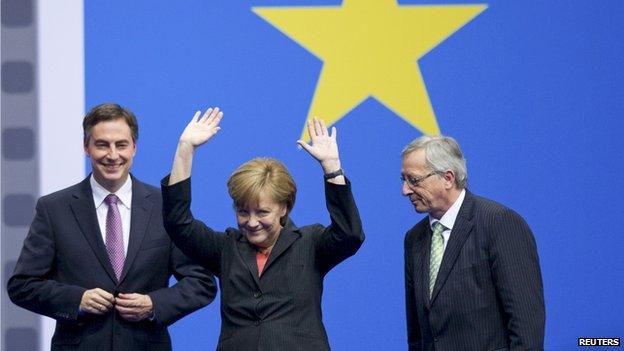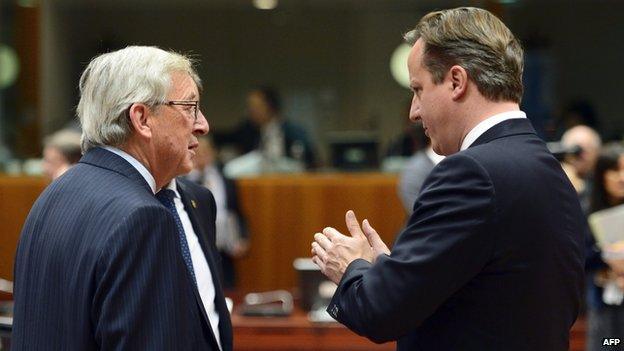How far will Merkel back Juncker?
- Published

Mr Juncker (right) attended Chancellor Merkel's CDU party congress in April
As is often the case, nobody quite knows what Chancellor Merkel really wants the outcome to be. This time it is the unfolding row over who should be the next European Commission president.
As is always the case, she chooses her words carefully - but they are open to interpretation.
She made two statements on the matter last week, starting with one which seemed to indicate she wasn't set on Jean-Claude Juncker getting the job, and ending the week with one which indicated she was set on him getting it.
Her first statement was that a "broad tableau" should be considered for the position (obviously not an endorsement).
But days later she said: "I will now lead all negotiations in the spirit that Jean-Claude Juncker should become president of the European Commission." A careful reading of this second statement shows it to be not quite a 100% endorsement - she is not quite saying he should get the job, but it was read that way.
Bild steps in
Between the two statements came a searing editorial in Bild, the biggest paper in Germany and the one her supporters and potential supporters (also known as voters) read.
The European elections ushered in a new way of selecting the Commission president. Previously, he (always he so far) had been chosen by the leaders of the member countries. Unanimity was important, though usually after horse-trading.
This time, each of the political groupings put forward "Spitzenkandidaten" (top candidates) for the job. The centre-right grouping (which does not include the British Conservatives) got the most seats and their candidate was Mr Juncker.
But under the new rules, it isn't quite an election - it is a recommendation, which the national leaders could still throw out.
When Mrs Merkel indicated with her first statement that she was minded not to back Mr Juncker, Bild went into rhetorical overdrive.
An editorial by the publisher, external, no less, said: "Europeans want Juncker as EU president. [The German candidate of the Party of European Socialists bloc, Martin] Schulz got the second-best result. A third, who didn't stand for election, can't be allowed to get the job. That would turn democracy into a farce. You may get away with something like that in the GDR or in far-right banana republics. But not in the EU. Otherwise it will abolish itself."

Mr Cameron (right) and Mr Juncker have very different visions for the EU
Berlin is now buzzing with conspiracy theories. What does Mrs Merkel really want, the chattering classes ask.
One theory is that she saw the election results, with the strong showing for sceptical parties throughout Europe, as a big signal that something needed to change. The case for Europe had to be made. The people in charge in the past couldn't make the case in the future - and Mr Juncker was one of those.
At the same time, there is no doubt that UK Prime Minister David Cameron told her that Mr Juncker getting the job would create difficulties for him - though it is not clear, and seems unlikely, that he said bluntly that if Mr Juncker were president, Britain would bring forward its referendum on EU membership.
In that scenario, Mrs Merkel thought Mr Juncker might not be ideal and tried to prepare a way for him to be ditched, but the reaction of the German press, particularly Bild, got in the way.
The result is that she has little choice but to back Mr Juncker and that puts Mr Cameron in difficulty. But there's a lot of politics yet to be done.